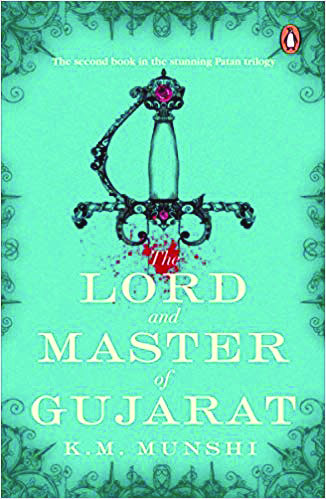The Lord and Master of Gujarat
Author : KM Munshi
Publisher : Penguin, Rs 599
A skilled and compelling translation of KM Munshi’s celebrated Gujarati novel, Gujarat No Nath, The Lord and Master of Gujarat is brilliant in its plot and narration, writes Anubhav Pradhan
Meandering through the substantive collections of Shanghai Museum, right in the heart of People’s Square, I could not but be awed by the hoary antiquity and rich sense of civilisational oneness of the Chinese people. Here was a ritual bronze from the late 20th century BC, there a celadon from the early 3rd century AD. Of course, museums are key ideological sites where history is dusted and given direction, but, even so, China’s accomplishments as perhaps the world’s oldest continuing culture seem to easily tower over the rest of humanity.
This is why reading KM Munshi’s The Lord and Master of Gujarat in Shanghai was probably not the best idea. For, not only is China impressive as a civilisation, Shanghai is overwhelming as a city. To be in Shanghai and read of the glory of early medieval Gujarat is to be treated to a joke, ironic and ridiculous in equal measure. The wealth, order, and vibrancy of a city like Shanghai, how successfully it has augmented its public infrastructure and economy, these are without parallels in the Indian subcontinent, leave alone Gujarat. Pride in the Chinese for their history and their achievements seems inevitable, fitting; in Munshi, for Gujarat, it seems sadly pretentious, an affection worth only half-hearted indulgence.
To be fair, this is wholly my fault than Munshi’s or his translators’. Admittedly, except commending the translators for doing complete justice to the original in this grippingly vivid rendering, there is little I can say which will add on to the fame and prestige of Gujarat no Nath. A foundational pillar of Gujarati cultural selfhood as we know it, Munshi’s Patan triology shines bright with the iridescence of a timeless masterpiece. Rita Kothari’s and Abhijit Kothari’s translation of this classic has created a gem in its own right, likely to become a beacon in the annals of Indian historical fiction in English. This dashing, thrilling saga of romance, adventure, statecraft, and war will excite and inspire readers of all ages for many generations yet to come. No, I myself am at fault for not being adequately impressed by the novel. I’ve ruined it for myself by reading it in probably the worst possible place.
Consider: Patan, the small capital of a young princely confederacy. Patan, a provincial power amongst a subcontinent of warlike giants. Patan, a name stained with the shadow of defeat and dissonance. Consider again: Shanghai, a mercantile capital built in steady defiance of marsh and mud. Shanghai, a colossal growth engine tipping the globe’s balance of power. Shanghai, a name conjuring strength, wealth, and ingenuity.
None of this undermines the brilliance of the plot or the vigour of the narration though. Leaving behind The Glory of Patan, The Lord and Master of Gujarat creates such a charged atmosphere of high suspense and courtly drama that that I hurtled breathlessly through the book till the last four hundred and eighty-fifth page had been flipped over to a tensely tranquil close. Kaak and Manjari’s layered relationship, the blossoming of their mutual love, pales into insignificance the great allegorical archetypes of romance, while Kirtidev’s zeal and Krishnadev’s zest lends a rich depth of meaning to the text. Unlike its predecessor, The Lord and Master of Gujarat is a carefully nuanced and keenly animated portrait of these figures of lore and legend who shaped the destiny of Gujarat.
No, what undid Munshi for me this time was that I was reading him in China. Even as the narrative thrills the heart into a frenzy of anticipation, the mind is left perturbed with the confident superiority of the text. The overwhelming, overarching sense of cultural parochialism of Munshi’s Patan seems eminently uncalled for, the mark of a weak and vulnerable people prone, consequently, to brash boasting. In the larger scheme of history, of the rise and fall of civilisations, it also feels futile: True, both Kirtidev and Krishnadev are reflective enough to imagine the fall of Patan, but both are still too bound in their ambitions as monarchs and rulers to realise the smallness of their hopes.
To persevere against the blows of cruel time, to reach for immortality even in the shadow of death, this in writing is the mark of greatness. It is futile, it is vain, it is impossible, but it has a certain beauty which illumines the soul with a whisper of undying glory. Munshi’s enduring charm lies in conjuring this ethereal, ephemeral sense of grandeur, even if it is simultaneously undermined by the anxious fragility of its evocation.


























